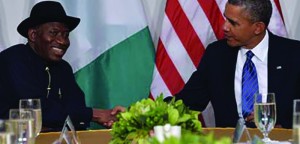 INTERNATIONAL response to last week’s postponement of Nigeria’s presidential and general election may have provoked serious worries and consideration of the option of targeted sanctions on certain government and security officials by the United States (US) government in Washington DC and other western capitals, Empowered Newswire reports.
INTERNATIONAL response to last week’s postponement of Nigeria’s presidential and general election may have provoked serious worries and consideration of the option of targeted sanctions on certain government and security officials by the United States (US) government in Washington DC and other western capitals, Empowered Newswire reports.
A White House spokesperson, Edward C. Price, had exclusively informed Empowered Newswire that the US government was deeply disappointed over the delay in the date of the Nigerian polls, even after the US Secretary of State, John Kerry, had hurriedly issued a strong-worded condemnation of the decision last Saturday evening.
Sources revealed that there were now considerations within the US official circles for possible sanctions that would target specific government and security officials in Nigeria, should there be any further “threat” to holding of the elections.
It explained that it was because of this possibility of sanctions such as visa restrictions on already identified security and presidency officials that the US was insisting that the new dates must not be changed.
One of America’s leading newspaper, Washington Post also did an editorial the week, specifically on Tuesday, February 10, warning that “the looming danger is that Mr Jonathan and his military supporters will attempt to further delay the elections.”
The editorial called on White House to take steps to insist on no further delay of the polls, by saying “the Obama administration should now enlist European and African states in a diplomatic offensive to insist that the elections go forward.”
Criticising the delay, the newspaper stated that it “has not only endangered the country’s fragile democracy, but also greatly increased the risk that Africa’s most populous country will collapse into civil strife.”
The newspaper noted that it observed that the military in Nigeria had forced the postponement.
Regarding Nigeria’s President Goodluck Jonathan’s perceived role in the delay of the polls, it added that while he “has appeared indifferent to the terrorists’ advances, made no secret of his desire to put off the election. The president appears to calculate that with six more weeks to campaign with vastly more resources than his challenger, he will be able to establish a decisive advantage.”
In fact, the worries about the delay of the polls were so deep in the US that the Nigerian ambassador to the US, Professor Ade Adefuye disclosed that he had been inundated all week with calls from both the US government, including the congress, the media and the society at large.
The ambassador, however, put a positive spin on it, adding that the “Embassy is pleased with the widespread interest in these elections and wishes to assure all that the elections, now rescheduled to begin on March 28, will proceed as planned.”
US sources explained that what irked top officials of the US government, including President Barack Obama and Kerry was that the US government had specifically requested and advised the Nigerian government to ensure that the elections were held as previously planned, so as not to provoke latent fear and cynicism that a delay might produce.
Also, the impression said to have been given the US government, especially during a visit by the Secretary of State to Nigeria, where he met President Jonathan and General Buhari, was that the Independent National Electoral Commission (INEC) would be left alone as an independent agency to run the election.
“The announcement of the delay, therefore, represented to the US government a loss of trust in an already strained relationship with the Nigerian government. It is the trust issue,” according to a source that is now fuelling the consideration for targeted visa sanctions against some top officials, especially in the Nigerian security agencies and the presidency.


Be the first to comment